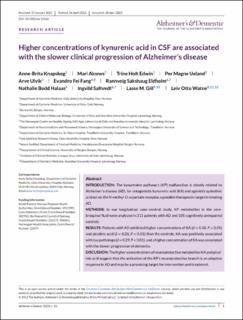Higher concentrations of kynurenic acid in CSF are associated with the slower clinical progression of Alzheimer's disease
Knapskog, Anne Brita; Aksnes, Mari; Edwin, Trine Holt; Ueland, Per Magne; Ulvik, Arve; Fang, Fei; Eldholm, Rannveig Sakshaug; Halaas, Nathalie Bodd; Saltvedt, Ingvild Tina; Giil, Lasse Melvær; Watne, Leiv
Journal article, Peer reviewed
Published version

Åpne
Permanent lenke
https://hdl.handle.net/11250/3082979Utgivelsesdato
2023Metadata
Vis full innførselSamlinger
- Department of Clinical Science [2318]
- Registrations from Cristin [9791]
Sammendrag
Introduction: The kynurenine pathway's (KP) malfunction is closely related to Alzheimer's disease (AD), for antagonistic kynurenic acid (KA) and agonistic quinolinic acid act on the N-methyl-D-aspartate receptor, a possible therapeutic target in treating AD.
Methods: In our longitudinal case–control study, KP metabolites in the cerebrospinal fluid were analyzed in 311 patients with AD and 105 cognitively unimpaired controls.
Results: Patients with AD exhibited higher concentrations of KA (β = 0.18, P < 0.01) and picolinic acid (β = 0.20, P < 0.01) than the controls. KA was positively associated with tau pathology (β = 0.29, P < 0.01), and a higher concentration of KA was associated with the slower progression of dementia.
Discussion: The higher concentrations of neuroprotective metabolites KA and picolinic acid suggest that the activation of the KP's neuroprotective branch is an adaptive response in AD and may be a promising target for intervention and treatment.
